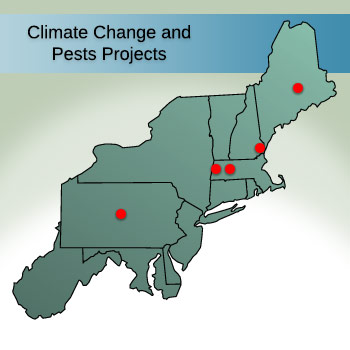
We expect there will be changes in pest distribution and management needs due to climate change.
What will the changes in climate mean for the distribution and occurrences of pests? What tools will help in addressing the needs? Our Center is partnering with other leading organizations on initiatives related to climate change and pests.
Human-induced climate change is resulting in an increase in extreme weather events and a gradual rise in average annual temperatures. The Northeast is not immune to the varied patterns in weather that are impacting both agricultural and natural ecosystems. It is not widely known what the changes in climate will mean for the distribution and occurrences of pests and little information exists as to how IPM practices will need to be tailored and what specific tools will help in addressing emerging needs.
Our Center has begun exploring ways to partner with other groups and organizations who are developing information for basic understanding and practical application. For example, the USDA’s Northeast Climate Hub, the Regional IPM Centers, the National Academy of Sciences, the American Society of Agronomy, and the Cornell Institute for Climate Change and Agriculture have partnered with our Center to organize a national forum with experts in climate and pest disciplines to share the latest, science-based information and strategize ways to plan policies for adaptable and resilient agriculture and forestry ecosystems that are threatened by pests related to climate change.
Our Center and partners anticipate that from the National Forum on Climate and Pests, regional frameworks will be developed to support pest management decisions that will lead to more sustainable U.S. agriculture and forestry ecosystems in changing climates. The long-term goal is to help U.S. agriculture and forestry minimize risks associated with increased severity and expansion of pest distributions resulting from climate variability. The major outcomes will be 1) new understanding of the vulnerabilities related to climate change with regard to pests in our agriculture and forestry ecosystems and 2) strategies to mitigate the effects from pests due to climate variability and develop resilient production systems.
In addition, our Center’s Partnership Grants Program provides an opportunity for Northeastern region colleagues to apply for grant funding for projects that would advance knowledge and our ability to apply IPM solutions to the challenges of climate change.
News and Information
- Scientist Sees Weeds as Indicators of Climate Change
-
Source: IPM Insights, January 2016.
- Climate Change Is the Elephant in the Room
-
Source: IPM Insights, January 2016.
- Bountiful Rains Bring Abundant Weeds; Wildfires Sure to Follow
-
Source: AgriLife Today, August 14, 2015.
- Redbanded Stink Bug Is Major Soybean Insect Pest in Louisiana
-
Source: Delta Farm Press, July 17, 2015.
- Climate Change Affects Migratory Pests
-
Source: Utah Pests News, Summer 2015.
- Introduced Annual Grass Increases Regional Fire Activity across the Arid Western USA
-
Source: Global Change Biology, January 2013.
Related Links
- USDA Northeast Climate Hub
- Northeast Regional Climate Center
- New York Climate Change Science Clearinghouse
- Cornell Institute for Climate Change & Agriculture
- WXshift — Local and national weather forecasts, climate trends, and reports.
- National Weather Service Climate Prediction Center
- Climate change and pests regional priorities
- Maine Climate and Ag Network — Farm response to changing weather

- 2018 – Establishing an IPM working group for spotted lanternfly research, management, and policy efforts (Penn State)
- 2018 – Invasion Watch: Tools for listing and visualizing invasive plant range shifts with climate change (University of New Hampshire)
- 2018 – Prioritizing the impacts of range-shifting invasive plants for prevention, monitoring, and management (University of Massachusetts Amherst)
- 2017 – Developing IPM tactics for browntail moth outbreak (University of Maine)
- 2017 – Northeast invasive hardy kiwi (Actinidia arguta) working group (Berkshire Environmental Action Team)